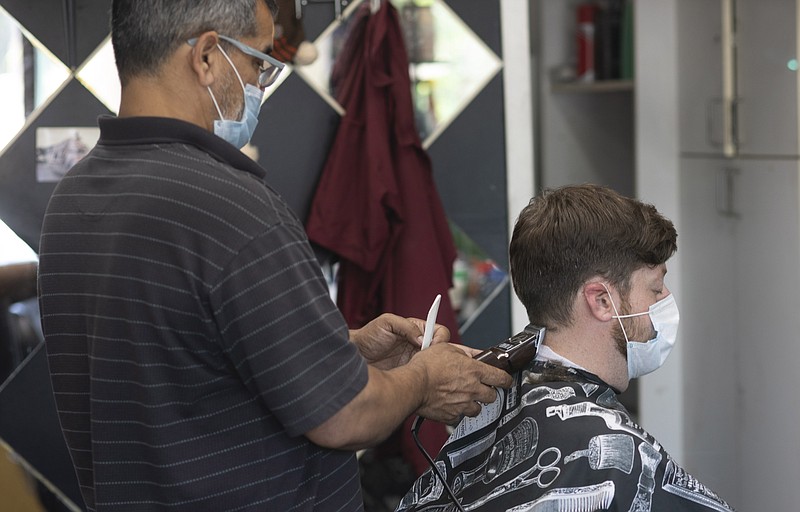Chances are, you've never heard of Elias Zarate. But you should.
The Memphis man was a victim of a state law - even a well-intentioned one - that kept him from plying the career he sought.
The good news is, thanks to the nonpartisan Beacon Center of Tennessee and a recent ruling by a Tennessee Chancery Court, he can now be the barber he's always wanted to be.
Sometimes, even in these days of a global pandemic, racial unrest and economic uncertainties, the good guys win. Not always, but sometimes.
Zarate's saga begins when the native Texan was essentially orphaned and abandoned at the age of 13. Going to school during the day and working at night to help support his two younger siblings, he made it through the middle of his 12th-grade year. But his grandparents became unable to care for his siblings, so he chose to drop out of school to care for them.
Where he could, he worked in a restaurant, as a manager of a construction crew installing ceramic tile and in other odd jobs to support his siblings as they finished high school. But what he was practicing on the side, and what he set his mind on doing, was becoming a barber.
Zarate one day would like to open his own shop, but his reputation for cutting hair was such that he was offered a job in a high-end shop in Memphis.
He'd hardly gotten started, though, when he had to stop. The problem was a 2015 law that mandated barbers have a high school degree. He was fined $1,500 for cutting hair without a proper license and summoned to a hearing in Nashville, where he accrued an additional $600 in court costs.
The law was inserted as part of a clean-up bill when the legislature was merging the state cosmetology and barber boards and apparently was seen as a protection for those already working in the field. Both cosmetologists and barbers, pre-2015, needed only finish 10th grade. While nothing changed for cosmetologists, the new law held barbers to a higher standard.
Nevertheless, the only difference in their work was that barbers could shave customers using a straight-edged razor (as opposed to a safety razor), while cosmetologists could perform pedicures.
The high school degree was only one step for potential barbers, though. To be licensed, they also had to attend barber school for 1,500 hours to learn the nuances of the trade. Only then could they take a state-approved test to demonstrate their competency.
Legislators debated repealing the law in 2018 but didn't, saying the high-school requirement might help students press on to graduation.
Ultimately, the Beacon Center, a Nashville public policy center, came alongside Zarate.
His case sought relief in two main areas. The first was that the high school requirement violates his right to earn a living and his right to equal treatment under the laws of the state and federal constitutions. The second is that the requirement results in unequal treatment under the law, the requirement for barbers being different from that for cosmetologists even though almost all of their duties are the same.
Even emergency medical responders, who in some cases apply life-saving measures prior to more extensive medical treatment, are not required to have a high school degree, Zarate's complaint pointed out.
Ajit Pai, the chairman of the Federal Communications Commission, even took up Zarate's case. In a commentary in the Memphis Commercial Appeal in 2018, he noted that in 1950 only one in 20 persons required the government's permission to work through the likes of licenses. Now, he said, it's about one in four.
"Altogether," he wrote, "about 1,100 occupations in America require a license - but only 60 of them require a license in all 50 states, suggesting that there are very few occupations viewed as essential to regulate."
The problem, Pai said, is that such occupational licensing hurts minorities, those with less income, individuals with less education and military spouses who frequently move the most.
And, he said, "rigorous studies have shown that occupational licensing generally doesn't benefit consumers with higher quality or safer services."
It took another two years to decide the case, but the ruling, which was filed Aug. 5, declared that the "academic achievement requirement of the Act ... is unconstitutional, unlawful and unenforceable."
"The government shouldn't stand between Elias and the career he loved just because he didn't graduate high school," Braden Boucek, vice president of legal affairs for the Beacon Center wrote in a news release, "... [The] ruling finally righted this injustice. After overcoming massive challenges throughout his life, Elias and other barbers who do not have a high school degree are finally able to go back to work."
We trust our legislators to enact laws that are based on the best research, opinions and testimony available, but they are not infallible. Sometimes how a jot or tittle of a law affects someone is not readily apparent, but can be corrected by the same legislature that enacted it or by the courts. We should be grateful for a government that allows such grievances to be redressed.
